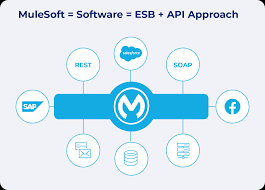MuleSoft Unveils Integration Solutions for Enhanced AI Agent Access to CRM and External Data
MuleSoft has introduced a robust suite of integration solutions designed to help developers and administrators seamlessly integrate both structured and unstructured data from CRM and external systems. This enables AI agents and assistants to operate on reliable data, enhancing their performance. With these integrations, businesses can fully leverage Salesforce Data Cloud and Agentforce to personalize customer experiences, augment employee workloads at scale, strengthen customer relationships, and ultimately drive revenue growth.
Admins can now easily access MuleSoft, Salesforce, and Heroku APIs while building AI agents and assistants. They can connect knowledge sources to Data Cloud and utilize pre-built connectors to streamline workflows across common systems and applications. Developers have the capability to create custom topics that define an AI agent’s work functions. Furthermore, they can build and manage AI agents outside the Salesforce environment through MuleSoft AI Chain—an open-source initiative that connects and orchestrates large language models (LLMs), vector databases, and APIs within a unified framework.
As customer expectations rise for quick and personalized service responses, companies must ensure they have immediate access to all relevant data sources and the ability to effectively utilize it with workforce-scaling AI agents and assistants. Despite this necessity, 95% of IT leaders report that integration challenges hinder AI adoption, creating a significant gap between the technology needed to meet customer demands and current capabilities.
MuleSoft’s integration, automation, and API management solutions are essential for enabling businesses to integrate their data
, maximizing the potential of AI agents and assistants both within and outside the Salesforce ecosystem:
- Low-Code Integration: Admins can utilize pre-built connectors within Flow Builder to securely access and integrate org-to-org and third-party data into their workflows. For instance, an admin could create a workflow that allows an autonomous sales agent to generate an invoice in QuickBooks whenever a new order is processed.
- Salesforce API Catalog: This single repository of APIs from Salesforce, MuleSoft, and Heroku is embedded directly within Salesforce. Admins can leverage these APIs to develop new topics and actions that enhance an AI agent’s capabilities, such as creating an inventory topic using integrations built with SAP.
- MuleSoft Direct for Data Cloud: This feature allows users to quickly locate and deploy pre-built integrations that connect data from sources like Google Drive, Microsoft SharePoint, Confluence, and web pages to Data Cloud directly from Salesforce. For example, admins can connect product specifications, internal FAQs, and wikis to Data Cloud, enabling AI prompts within Service Cloud for more timely and personalized customer service responses.
- MuleSoft Topic Center: Developers can publish agent topics or clusters of specific information or skills that Agentforce agents can utilize. These topics are created through integrations with various third-party systems, providing context to Agentforce agents and enhancing their effectiveness. For example, a developer might create a hardware device topic to determine if an employee should receive a laptop replacement, incorporating asset management and fulfillment APIs to inform the agent of the hardware replacement policy and ordering process.
- MuleSoft AI Chain: This open-source initiative facilitates interaction with LLMs, vector databases, and APIs, empowering developers to create their own agents or copilots. For example, a MuleSoft AI Chain connector could be used to link Jira with multiple LLMs, resulting in an agent capable of diagnosing new or updated bugs by summarizing issues, suggesting next steps, and assessing customer sentiment based on existing conversations.
“As organizations integrate AI agents and assistants into their processes, a straightforward approach to connecting core systems and applications with LLMs becomes crucial,” says Andrew Comstock, VP of Product Management at MuleSoft. “With MuleSoft’s latest innovations, we are laying the groundwork for scalable, context-aware AI that empowers teams across the enterprise to build a strong foundation for AI integration.”










